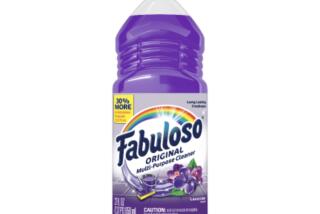Mold Found in Coke Products in Senegal
- Share via
ATLANTA — Coca-Cola Co., hard hit last year by a contamination scare that left hundreds of Europeans complaining of illnesses, said Wednesday it had suspended production of one-liter bottles of Sprite and Coca-Cola in Senegal after being alerted to the discovery of a mold-like substance in two items.
Atlanta-based Coca-Cola, the world’s largest soft drink company, said it was informed of the discovery during a meeting last week with Senegal Trade Minister Koureichi Thiam and other officials in the West African nation.
“We were called to the Ministry of Commerce and we were shown two bottles of one-liter Sprite and one-liter Coca-Cola which had a mold-like substance,” said Robert Lindsay, spokesman for Coca-Cola’s African and Middle East operations.
Analysts said it would be critical for Coca-Cola to respond to quality-control concerns in Senegal in a smoother fashion than it did last year when it was criticized for reacting slowly to a contamination scare in Belgium and France.
“Coke cannot leave any stone unturned. They have to jump on this,” said Marc Cohen, analyst with brokerage Goldman Sachs in New York.
Cohen, however, said it was not likely there would be a sell-off of Coke shares based on the current information out of Senegal.
Coke shares rose 79 cents on Wednesday to close at $58.79 on the New York Stock Exchange.
Lindsay said the beverage giant had agreed to suspend production of one-liter bottles of Sprite and Coca-Cola at its bottling operation in Senegal pending testing of the two bottles.
Coca-Cola said it was not asked to suspend any other products. The company added that it had received no reports of illness or consumer complaints in Senegal, where it controls about 90% of the small carbonated soft drink market.
Coca-Cola said it was conducting an extensive investigation of its operations, but the company added that it had found no other bottles in the marketplace with the same “batch codes” as the two suspect bottles.
“We are checking our own internal bottling processes to try to get to the bottom of this and, at the same time, working very closely with the ministry,” Lindsay said. The two suspect bottles are undergoing testing in both Senegal and Europe.
Coca-Cola was forced to pull 17 million unit cases from shelves last year after 200 Europeans, mostly children, complained they became sick after drinking contaminated products.
The company eventually traced the problem to a bad batch of carbon dioxide in Belgium and a foul odor from a chemical substance used on storage pallets at a bottling plant in France.
Questions about the quality control of Coca-Cola products in Senegal appeared to have originated with a local consumer group, which is believed to have presented the two suspect bottles to Senegalese authorities.
Earlier this week, Senegal said that tougher measures, including a ban on sales or a closure of Coca-Cola’s bottling operation, could be implemented if its products were shown to be unsuitable for consumption.
More to Read
Sign up for Essential California
The most important California stories and recommendations in your inbox every morning.
You may occasionally receive promotional content from the Los Angeles Times.













